It is 7pm on a Friday night and St John Ambulance NT already has 18 jobs banked up, all bar one of which are stabbings, assaults, or mental health related. They are in for a long night, writes Alex Treacy.
St John NT, the Territory’s major ambulance operator, already has 18 jobs banked up.
Duty manager Sam Cooper, who is based at Casuarina Ambulance Station tonight, says all bar one are stabbings, assaults or mental health related, meaning they can’t be attended to until NT Police officers are at the scene.
This is not unusual.
The NT News is spending a night on the road with Andrew Thomas, St John’s director of ambulance services.
He maintains his registration as an active paramedic, and gets out from behind the desk at least monthly, not only because he still feels the same rush from treating patients as he did when he started his career as a volunteer 35 years ago in South Australia, but also to check the pulse of his paramedics, who are being worked harder than ever.
According to the latest Productivity Commission Report on Government Services, St John transported 4553 more patients in 2022–23 compared to the year prior but received $1.3m less government funding.

It responds to 241.1 incidents per 1000 people in the NT, the highest response rate in the nation and significantly higher than the national average of 161.7.
And over the past five years, its call centre operators have seen a 52 per cent rise in the number of requests per annum, from 52,700 to 80,400.
Parallel to these pressures, the Territory is becoming more violent; assaults rose more than 70 per cent between June 2020 and March 2023.
Arrayed against this army of disorder is an arsenal that feels woefully outgunned, popguns facing off against howitzers: six emergency paramedic crews, two patient transport units, one critical response unit and one duty manager unit.
In greater Darwin, this is a full Friday night roster.
People talk about the thin blue line when referring to police.
But this thin red line is the width of a cigarette paper.
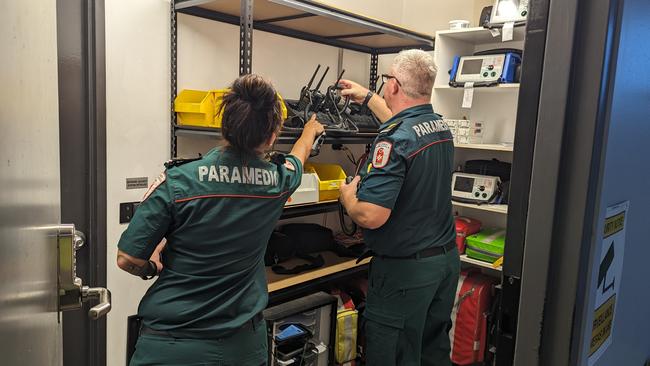
The war zone
Andrew buzzes through to the Joint Emergency Services Communications Centre at Knuckey Lagoon’s Peter McAuley Centre.
We are dispatched to Casuarina Square, to check out reports a woman has been assaulted.
Casuarina is a war zone, more D-Day than Darwin.
Driving down Trower Rd, there is a woman twerking in the middle of the intersection, wiggling her bottom at a banked line of traffic.
Fifty metres further, a man lies unconscious on the sidewalk, liquid pooling from his mouth as a shadowy figure stands over him.
They are not our jobs.
We arrive at the Casuarina bus exchange, which looks likely as there is a clump of police officers amid milling bystanders, but in fact we were due at the taxi rank.
Another crew is already there, and they are mopping up – a woman presented with a “decent cut on her arm” following an assault with a broken bottle, Andrew says.
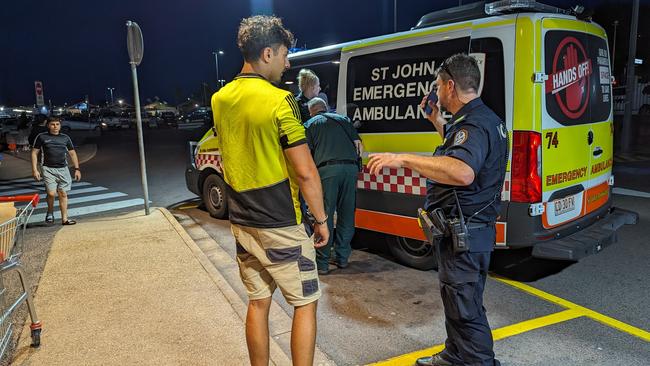
While he is shooting the breeze with the police officer monitoring the scene, a worried tradie in hi-vis strides over to report an all-in brawl at an adjoining carpark, with a person being kicked on the ground.
After hearing the victim was able to pick themselves back up and flee the assault, the officer offers what response he can.
“We’ll have a look at the camera and see if we can identify them, but we’ve got 20 things on at once,” he tells the tradie.
Fewer than five minutes after we depart, a priority one comes through the radio.
A woman has sustained a deep laceration to her arm and is in a state of “altered consciousness”.
She is at the Casuarina bus exchange.
Under pressure
Our next job is at Oaks Darwin Elan Hotel.
A 75-year-old has been reported unconscious in his room.
When we arrive, the room is crowded.
The patient, voice thick with liquor, is lying on the bed, surrounded by two paramedics and a man with dreadlocks who looked like a friend or relative.
The patient had stumbled and knocked himself out cold. There may also be associated diabetes issues.
A paramedic tells Andrew that it seemed unlikely this patient will want transportation, and the dreadlocked man has confirmed he can stay with the patient – a great outcome for the ambulance crew, who will soon be able to hit the road.
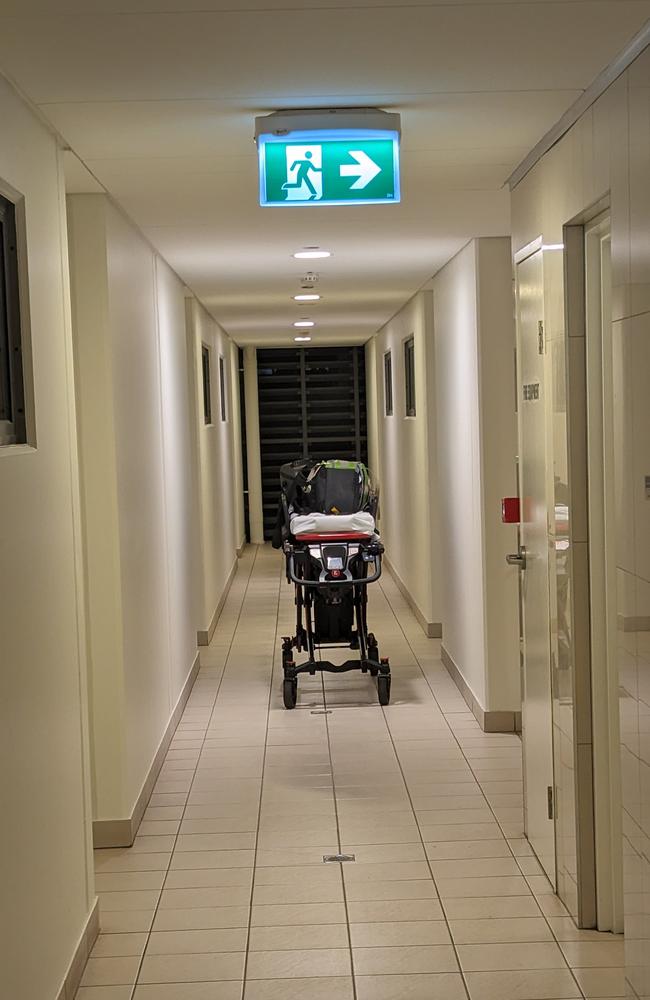
Asked about St John’s workload, funding and morale en route to the next job, Andrew is sanguine.
“We would like more crews. The workload continues to increase,” he says.
More funding would help, but Andrew is realistic about its likelihood. Every Territory organisation say they need more money.
More pressing than additional funding is the repeated assaults and verbal aggression directed at his paramedics.
“Too often we are having physical assaults,” he says.
“Our stats are saying since July last year, we’re well and truly over two a week.
“And I would say some of that is underreported.”
It weighs on him heavily.
“I feel like it’s my responsibility to make staff safe,” Andrew says.
No less of a diabolic issue for St John is ramping, wherein paramedics are tied down at Royal Darwin Hospital while they wait for a bed in the emergency department to become free for their patient.
“Ramping is endemic now in every state,” he says.
“It’s not solved by more ambulances.
“I don’t know how you fix it.”
In response, St John has created a new position, the hospital liaison officer, whose job is to co-ordinate the offloading of patients in an attempt to get paramedics back on the road sooner.
The position is filled through overtime.
“They come in on their days off. That’s great for the money, but then they’re not getting their days off,” Andrew says.
Later in the evening, when we swing by the emergency department, four out of the six rostered emergency ambulances are sitting idle in the ambulance bay.
Ms Cooper, the duty officer, has left her post at Casuarina to lend the hospital liaison officer a hand offloading patients to get crews out again as quickly as possible.
Calmness under fire
Andrew is told to approach the next job at Westralia St, Stuart Park, a well-known haunt for long grassers, with caution.
A priority one has been reported, a woman with “troubled breathing and altered consciousness,” but a crew previously there on a different job has warned of “aggressive people in the area”.
It looks deserted when we arrive, a Telstra payphone casting an orange glow over drifting bits of rubbish, but then we see Vera tottle out of the darkness, husband in tow.
She sits down in the gutter clutching her ear, which is infected.
Andrew radios in to reclassify the job as a priority three.
He takes her vitals and gives her Panadol and reassurance. There is little else he can do until an ambulance arrives to take her to the RDH, which she only recently departed after receiving care for an unrelated ailment.
As Andrew is ministering to Vera, her brother, Sammy, who is clearly intoxicated, emerges from his perch outside the shopping strip.
His wife has just been taken to the hospital. She must have been the previous job. He desperately wants a lift.
Andrew tells him there’s no room in his critical response unit due to the gear arrayed in the back seat.
Sammy then decides he wants his blood pressure taken. He is buzzing about like a fly. Andrew is calm but firm.
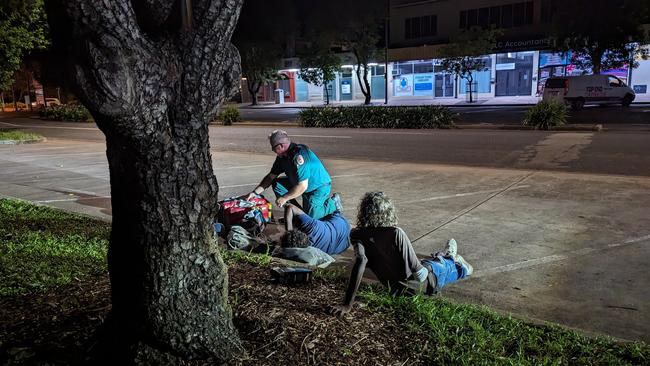
“Hang on mate, I’m a bit busy now looking after your sister,” he says.
Vera’s husband suggests pouring water into her ear to clean it out. Andrew explains why that’s a bad idea.
Sammy bursts out laughing.
A second woman arrives, also showing signs of intoxication.
“Vera, you right?” she asks.
The woman finds $3.50 on the ground and is very happy.
“Good night, God bless you all,” she says, before returning the way she came.
It’s chaotic, but Andrew can spin plates. Keep everyone in your eyeline, reassure the patient, calm the bystanders.
When the ambulance eventually arrives to take Vera and her husband, but not Sammy, his easygoing bonhomie takes a dark turn.
Andrew places himself between Sammy and his paramedic crew.
In a calming voice, he offers constructive suggestions, such as hailing down the next Night Patrol to see if they will give him a lift, while making it clear to Sammy he won’t be travelling in an ambulance.
Sammy cajoles, begs, growls, but eventually accepts his fate and plonks in the gutter, where we leave him.
“That case would have been easy to say bugger off, to go and see the clinic tomorrow,” Andrew says on the way out.
“But she was clearly in pain. She should have gotten it checked out when she was at the hospital. It would have been easy to give her a lecture.
“I’ve always had this view that you treat people with respect and most of the time you get that respect back.
“If you can look after the emotional side of somebody and provide a little bit of empathy and make them feel like you’re helping them, that’s 80 per cent of the job.”
Andrew knows the forces amassed against his organisation are monolithic.
“We have some of the sickest people in Australia. Layered on top of that is the workload and social issues,” he says.
“It’s a tough place to work.”

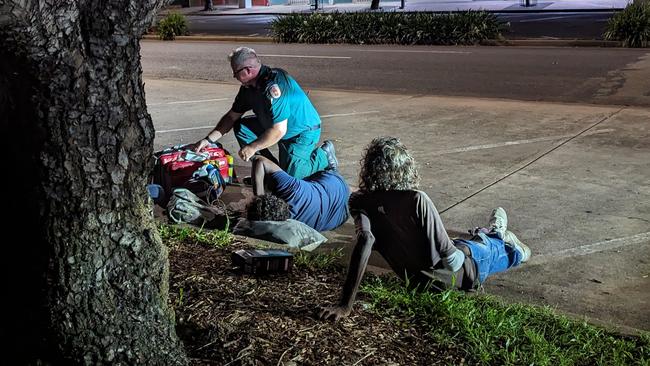
Add your comment to this story
To join the conversation, please log in. Don't have an account? Register
Join the conversation, you are commenting as Logout
‘It’s a coup’: ‘Terminated’ Alice Springs principal’s explosive allegations
The former principal of troubled Alice Springs school is alleging he was sacked after standing his ground over a proposal which is going to be ‘a sh-t show’.
Gaps in Darwin maternity services highlighted through stories of loss
Darwin families are making plans to leave the NT as shocking testimonies reveal gaps in maternity care, with some mothers seeking help four times before tragedy struck.